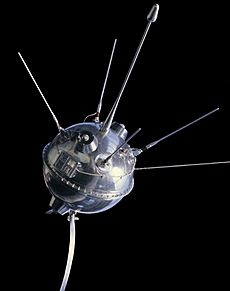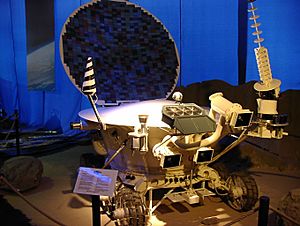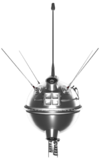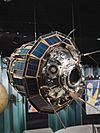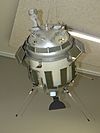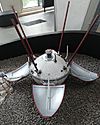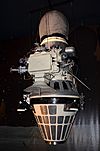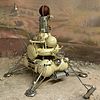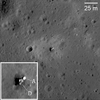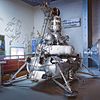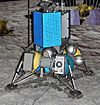Luna programme facts for kids
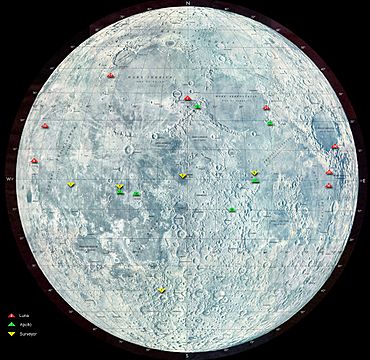
Locations of Luna landings on the Moon are marked in red; Apollo missions in green, and Surveyor in yellow.
|
|
| Country | Soviet Union, Russia |
|---|---|
| Purpose | Uncrewed exploration of the Moon |
| Status | Operational |
| Program history | |
| Duration | 1958–present |
| First flight |
|
| Last flight |
|
| Successes | 15 |
| Failures | 29 |
| Partial failures | 0 |
| Launch site(s) | Baikonur Cosmodrome |
| Vehicle information | |
| Launch vehicle(s) |
|
The Luna programme (from the Russian word Луна "Luna" meaning "Moon"), occasionally called Lunik by western media, is a series of robotic spacecraft missions sent to the Moon by the Soviet Union and later Russia between 1959 and 2023. Fifteen were successful, each designed as either an orbiter or lander, and accomplished many firsts in space exploration. They also performed many experiments, studying the Moon's chemical composition, gravity, temperature, and radiation.
Twenty-four spacecraft were formally given the Luna designation, although more were launched. Those that failed to reach orbit were not publicly acknowledged at the time, and not assigned a Luna number. Those that failed in low Earth orbit were usually given Cosmos designations. The estimated cost of the Luna programme in 1964 was US$6–10 billion.
Contents
Mission types
The name Luna was used to designate a variety of spacecraft designs, to achieve several types of missions:
Impactors
Impactor spacecraft are designed to hit the near side of the Moon. Luna 1 (January 1959) missed its intended impact with the Moon and became the first spacecraft to escape the Earth-Moon system. Luna 2 (September 1959) mission successfully hit the Moon's surface, becoming the first man-made object to reach the Moon. This was Luna's only impact success out of six tries from September 1958 to September 1959.
Flybys
A flyby is the simplest lunar spacecraft, requiring neither a propulsion device for slowing, nor a guidance system sensitive enough to hit the Moon. Its function is to transmit photographs back to Earth. Luna 3 (October 1959) rounded the Moon later that year, and returned the first photographs of its far side, which can never be seen from Earth. This was Luna's only successful flyby, out of three tries from October 1959 to April 1960.
Soft landers
Soft landers require rocket propulsion to slow their speed sufficiently to prevent the craft's destruction. They can continue to transmit pictures from the surface, and possibly dig into the lunar soil or return other information about the lunar environment.
Luna program landers had the generic designation of Ye-6 (or E-6 depending on transliteration from Russian). Two successful soft landings were achieved out of thirteen attempts from January 1963 to December 1966.
Luna 9 (E-6 No.13) became the first probe to achieve a soft landing on another planetary body in February 1966. It transmitted five black and white stereoscopic circular panoramas, which were the first close-up shots of the lunar surface.
Orbiters
Orbiter spacecraft require less thrust and propellant than landers, but still require enough to achieve lunar orbit insertion. Luna 10 (March 1966) became the first artificial satellite of the Moon. Luna flew six successful orbiters out of eight attempts from March 1966 to May 1974.
Rovers
More sophisticated soft lander craft can deploy wheeled vehicles to explore a wider area of the lunar surface than the immediate landing site. The first attempted Lunokhod failed in February 1969. Luna 17 (November 1970) and Luna 21 (January 1973) carried Lunokhod vehicles, which were the first robotic wheeled vehicles to explore the Moon's terrain. Lunokhod 1 travelled 10.5 kilometres (6.5 mi) in 322 days and returned more than 20,000 television images and 206 high-resolution panoramas. Lunokhod 2 operated for about four months, covered 42 kilometres (26 mi) of terrain, A third Lunokhod was built and intended for launch in 1977, but never flew due to lack of launchers and funding.
Sample return
More complex soft lander craft can robotically scoop up a small amount of lunar material, lift off from the surface, and return the material to Earth. Luna 16 (September 1970), Luna 20 (February 1972) and Luna 24 (August 1976), returned samples of lunar soil to Earth. A total of 301 g (10.6 oz) of soil sample was returned from the three missions.
Luna 15 (July 1969) flew at the same time as the Apollo 11 mission. Neil Armstrong and Buzz Aldrin had already performed the first crewed lunar landing when Luna 15 began its descent, and the spacecraft crashed into a mountain minutes later.
Mission success rates
While the programme was active, it was Soviet practice not to release any details of missions that had failed to achieve orbit. This resulted in Western observers assigning their own designations to the missions. For example, Luna E-1 No.1, the first failure of 1958 which NASA believed was associated with the Luna programme, was known as Luna 1958A.
| Luna | Competing United States programmes | |||||||||
|---|---|---|---|---|---|---|---|---|---|---|
| Type | First attempt | Attempts | First success | Successes | Rate | First attempt | Attempts | First success | Successes | Rate |
| Impactor | 23 Sep 1958 | 6 | Luna 2 Sep 13, 1959 |
1 | 16.7% | Ranger 1 23 Aug 1961 |
9 | Ranger 7 31 July 1964 |
3 | 33.3% |
| Flyby | Luna 3 6 Oct 1959 |
3 | Luna 3 | 1 | 33.3% | Pioneer 3 6 Dec 1958 |
2 | Pioneer 4 6 Mar 1959 |
1 | 50.0% |
| Soft lander | 4 Jan 1963 | 13 | Luna 9 3 Feb 1966 |
2 | 15.4% | Surveyor 1 2 Jun 1966 |
7 | Surveyor 1 | 5 | 71.4% |
| Orbiter | 1 Mar 1966 | 8 | Luna 10 3 Apr 1966 |
6 | 75.0% | Pioneer 0 17 Aug 1958 |
12 | Lunar Orbiter 1 18 Aug 1966 |
5 | 41.7% |
| Rover | 19 Feb 1969 | 3 | Luna 17 17 Nov 1970 |
2 | 66.7% | Apollo 15 31 July 1971 |
3 | Apollo 15 | 3 | 100.0% |
| Sample return | 14 Jun 1969 | 11 | Luna 16 24 Sep, 1970 |
3 | 27.3% | Apollo 11 24 Jul 1969 |
7 | Apollo 11 | 6 | 85.7% |
| Total | 44 | 15 | 34.1% | Total | 40 | 24 | 60.0% | |||
Mission details
| Public name | Internal name | Photo | Mission | Launch date | Carrier rocket | Outcome | Remarks |
|---|---|---|---|---|---|---|---|
| N/A | E-1 No.1 | Impactor | 23 September 1958 | Luna | Launch failure | Failed to orbit | |
| N/A | E-1 No.2 | Impactor | 11 October 1958 | Luna | Launch failure | Failed to orbit | |
| N/A | E-1 No.3 | Impactor | 4 December 1958 | Luna | Launch failure | Failed to orbit | |
| Luna 1 | E-1 No.4 | Impactor | 2 January 1959 | Luna | Launch failure | Also known as Mechta; placed onto incorrect trajectory, flew past the Moon without impacting; first spacecraft to escape geocentric orbit | |
| N/A | E-1A No.1 | Impactor | 18 June 1959 | Luna | Launch failure | Failed to orbit | |
| Luna 2 | E-1A No.2 | Impactor | 12 September 1959 | Luna | Successful | Impacted Palus Putredinis (29.10 N, 0.00 E) on the Moon on 14 September 1959 at ~07:30 GMT. First man-made object to reach the Moon. | |
| Luna 3 | E-2A No.1 | Flyby | 4 October 1959 | Luna | Successful | Took first photographs of the far side of the Moon. | |
| N/A | E-3 No.1 | Flyby | 15 April 1960 | Luna | Launch failure | Failed to orbit | |
| N/A | E-3 No.2 | Flyby | 16 April 1960 | Luna | Launch failure | Failed to orbit | |
| N/A | E-6 No.2 | Lander | 4 January 1963 | Molniya-L | Launch failure | Never left LEO | |
| N/A | E-6 No.3 | Lander | 3 February 1963 | Molniya-L | Launch failure | Failed to orbit | |
| Luna 4 | E-6 No.4 | Lander | 2 April 1963 | Molniya-L | Spacecraft failure | Failed to perform course correction manoeuvre; flew past the Moon | |
| N/A | E-6 No.6 | Lander | 21 March 1964 | Molniya-M | Launch failure | Failed to orbit | |
| N/A | E-6 No.5 | Lander | 20 April 1964 | Molniya-M | Launch failure | Failed to orbit | |
| Kosmos 60 | E-6 No.9 | Lander | 12 March 1965 | Molniya-L | Launch failure | Never left LEO, decayed five days later | |
| N/A | E-6 No.8 | Lander | 10 April 1965 | Molniya-L | Launch failure | Failed to orbit | |
| Luna 5 | E-6 No.10 | Lander | 9 May 1965 | Molniya-M | Spacecraft failure | Failed to decelerate; impacted Mare Nubium | |
| Luna 6 | E-6 No.7 | Lander | 8 June 1965 | Molniya-M | Spacecraft failure | Failed to perform course correction manoeuvre; flew past the Moon | |
| Luna 7 | E-6 No.11 | Lander | 4 October 1965 | Molniya | Spacecraft failure | Attitude control failure; impacted Oceanus Procellarum | |
| Luna 8 | E-6 No.12 | Lander | 3 December 1965 | Molniya | Spacecraft failure | Attitude control failure; impacted Oceanus Procellarum | |
| Luna 9 | E-6 No.13 | Lander | 31 January 1966 | Molniya-M | Successful | Landed in Oceanus Procellarum (7.08 N, 295.63 E) 18:44:52 GMT on 3 February 1966. First soft landing on the Moon. | |
| Kosmos 111 | E-6S No.204 | Orbiter | 1 March 1966 | Molniya-M | Launch failure | Never left LEO, decayed two days later | |
| Luna 10 | E-6S No.206 | Orbiter | 31 March 1966 | Molniya-M | Successful | ||
| Luna 11 | E-6LF No.101 | Orbiter | 24 August 1966 | Molniya-M | Successful | ||
| Luna 12 | E-6LF No.102 | Orbiter | 22 October 1966 | Molniya-M | Successful | ||
| Luna 13 | E-6M No.205 | Lander | 21 December 1966 | Molniya-M | Successful | Landed in Oceanus Procellarum (18.87 N, 297.95 E) 18:01 GMT on 24 December 1966 | |
| N/A | E-6LS No.112 | Orbiter | 7 February 1968 | Molniya-M | Launch failure | Failed to orbit | |
| Luna 14 | E-6LS No.113 | Orbiter | 7 April 1968 | Molniya-M | Successful | ||
| N/A | E-8 No.201 | Rover | 19 February 1969 | Proton-K/D | Launch failure | First attempt to launch Lunokhod. Failed to orbit, Lunokhod destroyed. | |
| N/A | E-8-5 No.402 | Sample return | 14 June 1969 | Proton-K/D | Launch failure | Failed to orbit | |
| Luna 15 | E-8-5 No.401 | Sample return | 13 July 1969 | Proton-K/D | Spacecraft failure | Entered selenocentric orbit successfully, failed during descent on 21 July 1969; impacted the Moon while Apollo 11 was on the surface | |
| Kosmos 300 | E-8-5 No.403 | Sample return | 23 September 1969 | Proton-K/D | Launch failure | Never left LEO, decayed four days later | |
| Kosmos 305 | E-8-5 No.404 | Sample return | 22 October 1969 | Proton-K/D | Launch failure | Never left LEO, decayed two days later | |
| N/A | E-8-5 No.405 | Sample return | 6 February 1970 | Proton-K/D | Launch failure | Failed to orbit | |
| Luna 16 | E-8-5 No.406 | Sample return | 12 September 1970 | Proton-K/D | Successful | Landed in Mare Fecunditatis (0.68 S, 56.30 E) at 05:18 GMT on 20 September 1970. Sample returned to Earth on 24 September 1970 | |
| Luna 17 | E-8 No.203 | Rover | 10 November 1970 | Proton-K/D | Successful | Landed in Mare Imbrium (38.28 N, 325.00 E) at 03:47 GMT on 17 November 1970. Deployed Lunokhod 1 | |
| Luna 18 | E-8-5 No.407 | Sample return | 2 September 1971 | Proton-K/D | Spacecraft failure | Entered selenocentric orbit successfully, failed during descent; impacted Mare Fecunditatis (3.57 N, 50.50 E) | |
| Luna 19 | E-8LS No.202 | Orbiter | 28 September 1971 | Proton-K/D | Successful | ||
| Luna 20 | E-8-5 No.408 | Sample return | 14 February 1972 | Proton-K/D | Successful | Landed in Mare Fecunditatis (3.57 N, 56.50 E) at 19:19 UTC on 21 February 1972. Sample returned to Earth on 25 February 1972 | |
| Luna 21 | E-8 No.204 | Rover | 8 January 1973 | Proton-K/D | Successful | Landed in Le Monnier (25.85 N, 30.45 E) at 23:35 UTC on 15 January 1973. Deployed Lunokhod 2 | |
| Luna 22 | E-8LS No.206 | Orbiter | 29 May 1974 | Proton-K/D | Successful | ||
| Luna 23 | E-8-5M No.410 | Sample return | 28 October 1974 | Proton-K/D | Spacecraft failure | Landed in Mare Crisium, fell over upon landing | |
| N/A | E-8-5M No.412 | Sample return | 16 October 1975 | Proton-K/D | Launch failure | Failed to orbit, intended to return a sample from Mare Crisium | |
| Luna 24 | E-8-5M No.413 | Sample return | 9 August 1976 | Proton-K/D | Successful | Landed in Mare Crisium (12.25 N, 62.20 E) at 02:00 UTC on 18 August 1976. Sample returned to Earth on 22 August 1976 | |
| Luna 25 | E-8-5M No.414 | Lander | 10 August 2023 | Soyuz 2.1b | En route |
See also
 In Spanish: Programa Luna para niños
In Spanish: Programa Luna para niños
- Luna (rocket)
- Luna-Glob
- Soviet crewed lunar programs
- Soviet space program
- Surveyor program
- Pioneer program
- Ranger program


